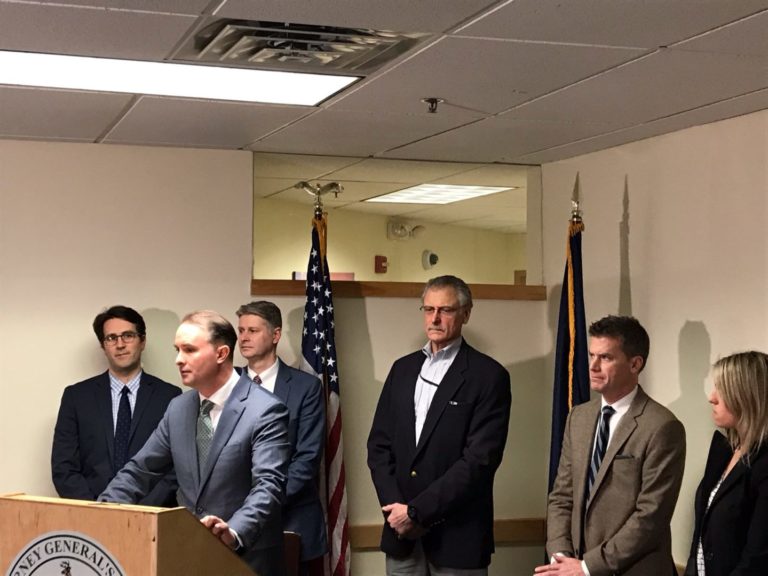This week’s Legislative Update is sponsored by:
March 13, 2020
Anyone who has worked in the Vermont State House will tell you that in normal times the place is a petri dish, with small cramped committee rooms, people who travel all over the region, and more visitors than a building its size can easily accommodate. Concern about coronavirus and a crossover deadline made for a chaotic week.
We are here to provide leadership and support to our membership base in times like these. Please let us know how we can further help you by taking this survey. Before we get into a breakdown of bills, here is a COVID-19 recap of what we are seeing this week:
Week’s Breakdown
On Saturday, March 7, Vermont reported its first case of COVID-19. The disease is not currently widespread throughout the state. At this time, preparation continues to be the recommended priority for Vermont’s business community.
On Monday, we compiled resources for our member businesses to help you further understand and prepare for the impacts of COVID-19 transmission in Vermont, the United States, and abroad. We have also published our own COVID-19 Resource Guide.
Out of an abundance of caution around COVID-19, on Monday LCRCC decided to POSTPONE our March 16 Legislative Breakfast. We hope to reschedule soon.
On Wednesday, Senator Patrick Leahy announced $4.9 Million in emergency grants related to COVID-19 in Vermont from an emergency $8.3 billion emergency supplemental appropriations package that was signed into law and negotiated by the Senator last week.
On Thursday, LCRCC’s team joined the Attorney General to send a message of calm and common sense to remind Vermonters and Vermont businesses of the consumer protections available to them during these times of potentially predatory practices or scams.

LCRCC also sent a memo to the Agency of Commerce and Community Development outlining supply chain and workflow disruptions and suggestions to stabilize the local economy. It became abundantly clear to LCRCC early in the week that the best-case scenario for Vermont would see few people infected while still seeing an economic downturn due to supply-chain issues, workflow interruptions, and a drop in consumer spending. This is not a reason to panic; this is a reason to prepare. LCRCC conveyed in the memo a desire to see;
- Ensure that Vermont businesses can access Personal Protective Equipment (PPE) needed to maintain workflow
- Reinforcing the state’s short-term unemployment insurance program
- Begin looking at expected revenue shortfalls and planning
- Create emergency low-interest loans for affected businesses
- Help businesses access virtual selling opportunities in the absence of trade shows
Work began on these issues in legislative committees on Thursday and Friday. On Thursday the Speaker held a meeting with committee chairs to readjust legislative workloads.
On Friday, House leadership put out the message to chairs to halt all non-essential legislation. At 10:00 AM on Friday, the Joint rules committee decided that the legislature would vacate the State House for 10-days. The Legislature is set to reconvene on March 24th. The Senate President said on the floor that “crossover will become more flexible.” Chairs will submit bills to leadership consideration if they were close to completion yet hindered by emergency action.
The House Committee on Commerce and Economic Development heard from the Treasurer and financial institutions about the opportunities to help Vermonters weather economic impacts of this situation on Friday morning. The Vermont Economic Development Authority has made a request to the legislature for $800,000 for 1% interest loans to help businesses at this time and that they might be looking for more funding at a later date to help lower interest rates for existing loan-holders that might have trouble. The message was clear from all the financial institutions; go to your financial institutions sooner rather than later if you think you are going to run into trouble.
The House Committee on Commerce and Economic Development spent much of the afternoon looking at how to ensure stability in the unemployment insurance (UI) program. They passed a bill that would expand the ability for employees to be eligible for UI and hold employers’ experience rating harmless (* important note: employers who do not pay UI taxes and are self-reimbursed employers will not get any benefit out of this). The House suspended their rules to pass this bill more quickly than normal and send the bill to the Senate.
Governor Phil Scott declared a state of emergency in response to the coronavirus pandemic on Friday.
In this week’s update;
- A recap of what LCRCC is doing on COVID-19 and what is happening in the State House
- PFAS bill passes out of Senate Health and Welfare Committee
- Economic Development bill passes Senate Committee
- Student debt relief package
- Renewable Energy Standard compromise may be in sight
PFAS Bill Passes Senate Health and Welfare Committee
This week, the Senate Committee on Health and Welfare took more testimony than it had in the previous eight weeks of the legislative session on S.295, a bill that would ban the use of perfluoroalkyl and polyfluoroalkyl substances, commonly referred to as PFAS and bisphenol A, commonly referred to as BPA. Both these substances are ubiquitous in products such as firefighting foam, food packaging, and residential carpet. In the final version, if the Vermont Department of Health does determine they will ban for food packing, the prohibition cannot take effect until two years after the Vermont Department of Health determines what the safer alternative is. We’ll have a more in-depth analysis of this bill in the coming weeks.
Housing Bill Passes the Senate Economic Development Committee
The Senate Committee on Economic Development, Housing, and General Affairs was able to pass their long-awaited housing bill on Wednesday. As you may recall, this bill would have been the vehicle for a new housing bond which has been a large priority for members of that committee, but had drawn apprehension from the State Treasurer and others who share concern around the state’s credit rating. Instead of a bond, this version of the bill looks to direct half of last year’s increase in the property transfer tax to the Vermont Housing and Conservation Board to be used for affordable housing and infrastructure.
The bill also got a preliminary walk-through in Senate Natural Resources on Tuesday morning as this committee anticipated possession of the bill to work on the Act 250, zoning, and planning components. On Thursday afternoon, the Senate Finance Committee saw the bill for the first time with Committee members showing some skepticism of the price tag of the overall bill.
Economic Development Bill Passes Committee
Today the Senate Committee on Economic Development, Housing, and General Affairs passed S.256 which will;
- Create a pilot program for 15 municipalities to utilize what is being called “mini-TIFs” as gap funding for infrastructure projects that spur local economic development.
- Builds on the worker relocation program for a new employee incentive program to award a base grant of $5000.00 for qualifying expenses of new employees.
- A program to create an incentive to businesses with less than 30 employees in the form of a three-year convertible loan of no more than $150,000. The business is required to make monthly, interest-only payments during the award period. The interest rate shall not exceed one percent.
- Require a report from the Vermont Economic Progress Council to House Commerce and Ways and Means Committees by January 15, 2021. The Council shall make recommendations concerning the design and implementation of an additional incentive program within the VEGI program to incentivize large, anchor businesses throughout Vermont to make significant capital investments in their Vermont facilities.
Student Debt Assistance Package Gets More Time in Committee
On Thursday and Friday, the Senate Committee on Economic Development, Housing, and General Affairs squeezed in time to discuss S.331 which focuses on the economic hurdles facing the state’s young professionals. The bill creates a tax credit for businesses that provide student loan repayment for their employee, a tax credit for employees who receive student loan assistance, downpayment assistance to first-time homebuyers with student debt in opportunity zones, and an expansion of usage of 529 savings plans.
Read Monday’s VTDigger story highlighting this bill and the work LCRCC has done on this issue.
Renewable Energy Standard Compromise in Sight?
The debate over a bill that would require the state’s utilities to receive 100% of their energy portfolio from renewables moved from the Senate Finance Committee back to the Natural Resources Committee. There is still a broad consensus on the overall 100% goal, however, many are still concerned about a lack of cost containment and the impact on ratepayers from a requirement that 20% of that electricity comes what’s called Tier II, or small scale, in-state generation. As we’ve reported in past newsletters, this could increase electric rates by 4-11% annually.
Meanwhile, the Energy Action Network rolled out their Annual Progress report in a State House press conference on Wednesday in which they highlighted the successes of Vermont’s transition of its electrical sector away from fossil fuels. The crux of their message was that the biggest opportunities for Vermont to curb emissions are in the heating and transportation sectors. According to the report, the electrical sector is 8.33% of emissions in Vermont leading many in the building to wonder why potentially increase cost in the area with the lowest emissions?
This week, LCRCC joined other organizations outlining the potential for compromise. Finally, Friday morning, the Senate Natural Resources Committee committee decided to amend the bill to include the changes to Tier I that bring the RES to 100% and then study Tier II changes. The amendment is currently being drafted and will need to wait until the committee reconvenes.
The Laundry List
- A bill in the Senate Government Operations Committee would have required any professions regulated under the Office of Professional Regulation (OPR) to provide, at minimum, two hours of climate change education. The proposal was scaled back to only a study by OPR as to what different professionals already do.
- The Senate Committee on Finance passed S191, a Tax Increment Financing (TIF) bill. The bill allows for the use of debt proceeds to pay for the interest on debt service and shall not assess penalties on any tax increment financing district that used debt proceeds to pay for debt service during the period from January 1, 2006, to June 30, 2020.
- H.833 an act relating to the interbasin transfer of surface waters passed the House today. The bill directs the Secretary of the Agency of Natural Resources to convene a Surface Water Diversions and Transfers Study Group to investigate and make recommendations to the General Assembly regarding the environmental, economic, and recreational impacts of surface water diversions, including the transfer of surface water between watersheds.
- Early in the week, Senate President Tim Ashe signaled his intentions to propose a floor amendment to the miscellaneous DMV bill that would require the Governor to join the Transportation and Climate Initiative. The Senate Committee on Transportation reviewed the amendment on Thursday, however, the bill was passed over on Friday.
- The Senate Committee on Natural Resources and Energy voted to pass the S.227 banning single-use plastic in lodging establishments’ rooms and only provided by request. The Committee delayed the effective dates to match California’s timeline for these practices, as the Lake Champlain Chamber requested.
- If you are interested in what happened on Town Meeting Day around the state, take a look at these recaps from VTDigger and VPR.
Concerned or need to learn more about anything in this newsletter? Email our team at [email protected].
We look forward to working with you this session.
Sincerely,
The Lake Champlain Chamber Advocacy Team



